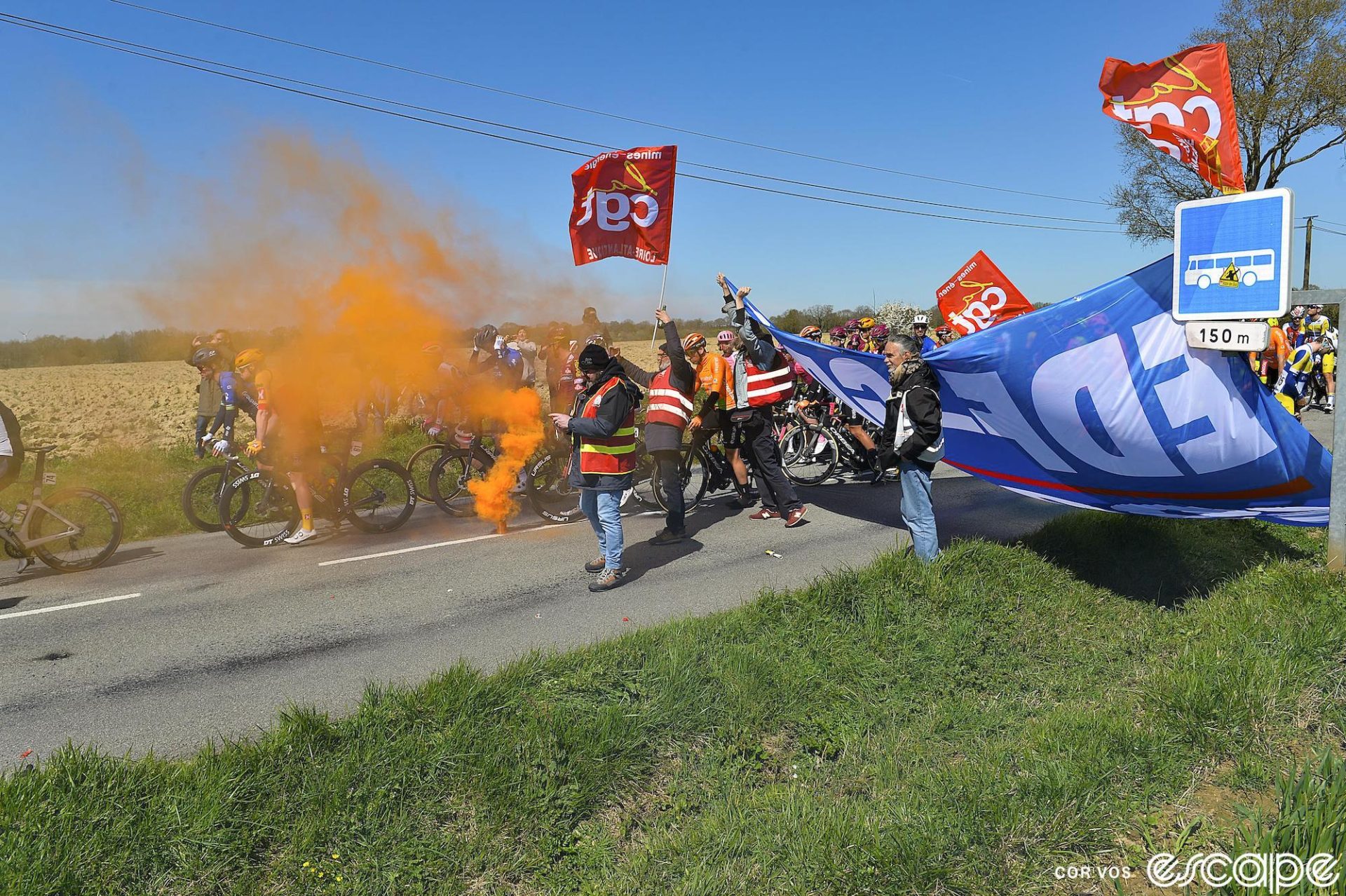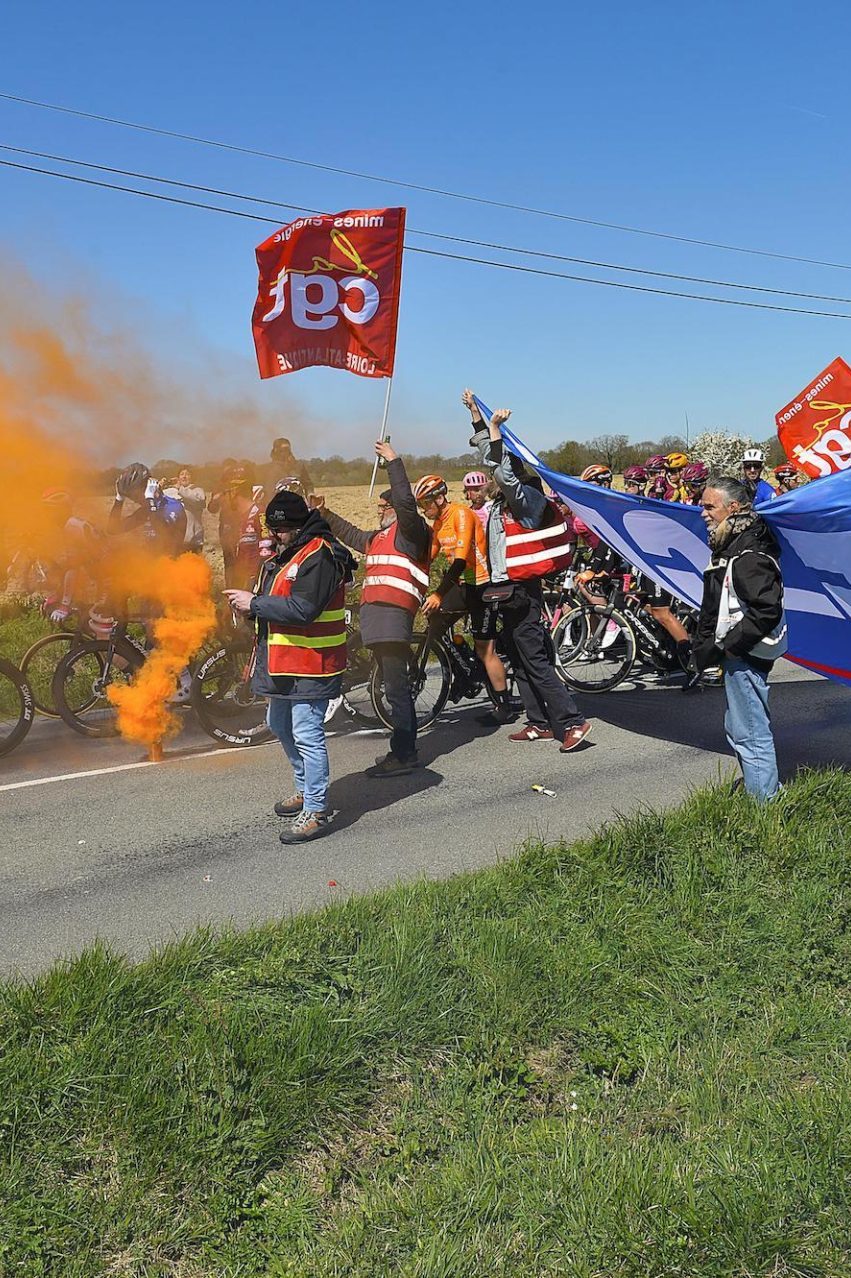In some extremely nerdy future edition of Jeopardy (category: bike racing and protests for $200), the question is “Who is no one?” and the answer is, “The winner of stage five of the Ruta del Sol.”
Such was the extraordinary turn of events in southern Spain last week, when four of the five stages of the race were cancelled outright and the third was turned into a prologue-to-nowhere style event – contested on road bikes because the original RdS route included no TT stages and so teams had not brought TT equipment – won by Maxim Van Gils, who will go down as perhaps another Jeopardy question/answer combo for “winner of the only one-day 2.Pro event in bike racing history.”
The cause of said cancellations – political protest – is one we’ve already seen this season, as stage 1 of the Étoile des Bessèges was also scuppered due to civil disobedience. The culprit in both cases was European farmers, who have a tick list of grievances and are shutting down roads in various parts of the European Union as a result. And with word of a related protest in the Italian town of San Remo (where, thankfully, there were no races last weekend but will be in a month), it’s likely that bike racing hasn’t seen the last of such disruptions this year.
At the root of the farmers’ complaints are, well, a lot of things. A short list: inflation, which has hit fuel, fertilizer, and animal feed costs; a host of issues with energy transition and environmental policy, namely the European Green Deal, which aims to make the bloc carbon-neutral by 2050; and over-cheap imports from outside the 27-nation EU.
Specific issues vary somewhat by country, Renaud Foucart, a senior economics lecturer at England’s Lancaster University, told CNN. “In Germany, it was really focused on starting to tax diesel for tractors,” he said. “In the Netherlands, the specific problem is the taxation of nitrogen, which affects the industrial production of pigs and chickens.” For Polish farmers, he added, the issue is less the Green Deal and more suspension of tariffs and duties on Ukrainian grain.
To be entirely clear, none of the farmers’ concerns has anything to do with bike racing per se. But as we’ve seen with past climate protests, bike races provide a handily accessible billboard for protest messages because they take place on open roads unlike, say, football matches, where access is far more tightly controlled.
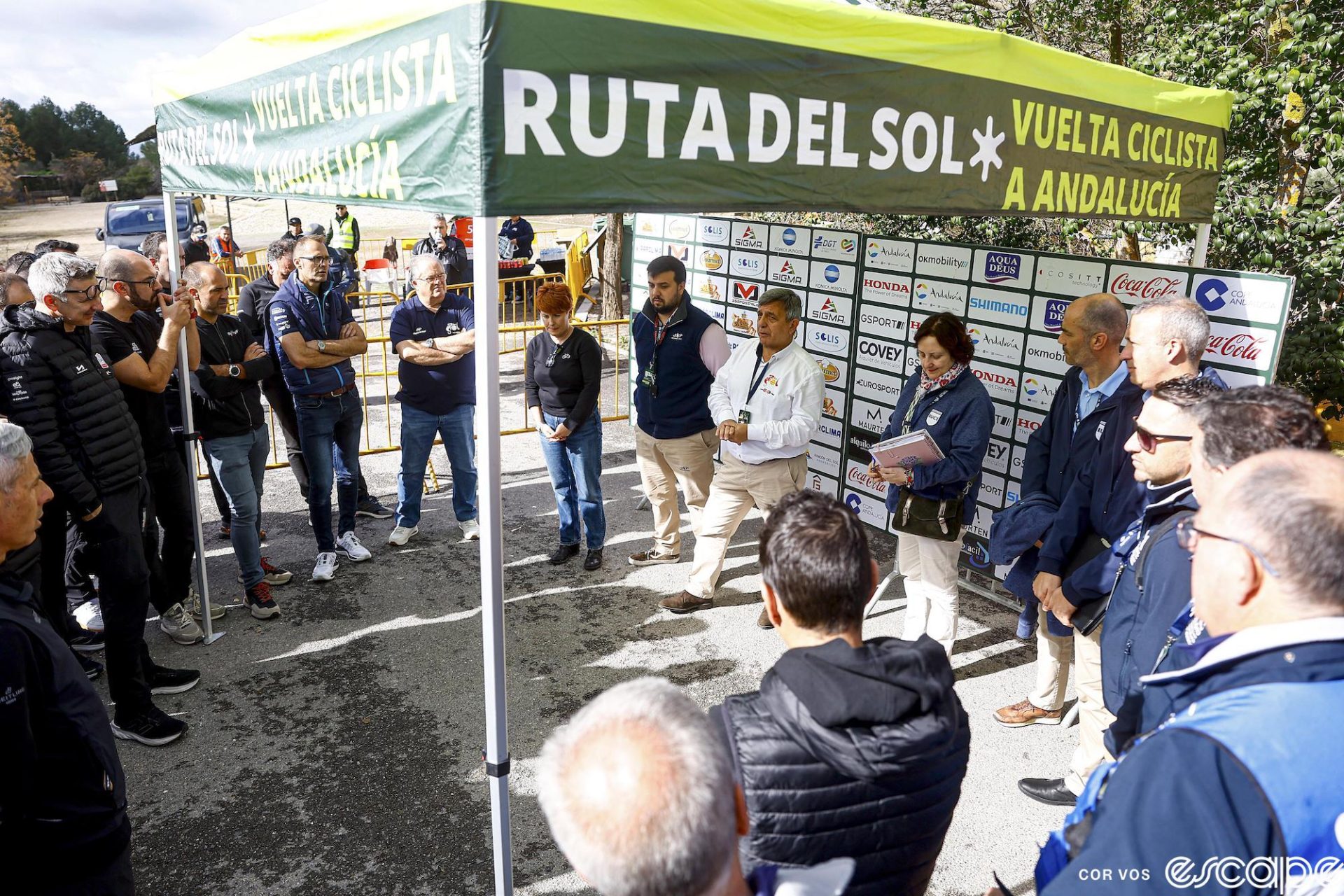
In the case of Bessèges and Ruta del Sol, however, the farmers weren’t even specifically targeting the races. And while farmers have protested at bike races recently (2022 saw protests at Omloop Het Nieuwsblad and the Vuelta España, for instance), they’ve largely not prevented the races from running. Cycling is simply a platform, or collateral damage.
But newer tactics make it far more likely that races will be truly disrupted like Bessèges and Ruta del Sol, than merely momentarily delayed, as has been the case with climate protests the past few years. Namely: farmers aren’t just hot-gluing themselves to the tarmac.
Instead, they’re using farm vehicles like tractors to block roads, shutting down all traffic in an area (including bike races). It’s a tactic farmers have employed before, and which was used to devastating effect by truckers at 2022’s so-called “Freedom Convoy” protests in Canada, which paralyzed the downtown of capital Ottawa for weeks on end.
Europe’s farmers have targeted some city centers, but they have also blocked highways around urban and rural areas with farm equipment and other obstacles, as they did recently around Paris. Near Vesoul, in eastern France just south of the Vosges region, farmers used trucks to dump loads of tires and manure, among other debris, onto roads.
None of that is easy or quick to remove, forcing abrupt, complicated course changes. But even when race routes aren’t directly affected by road closures, the protests pull away law enforcement personnel who otherwise would have been part of race security. That’s what happened at Ruta del Sol.
“After endless efforts, despite having all the permits and complying with the requirements established by the regulations, the authorities have not been able to ensure the assistance of the policy necessary to provide security for the race and all its riders,” the race organization said in an announcement that it would severely shorten the event to just a single 4.95 km time trial.
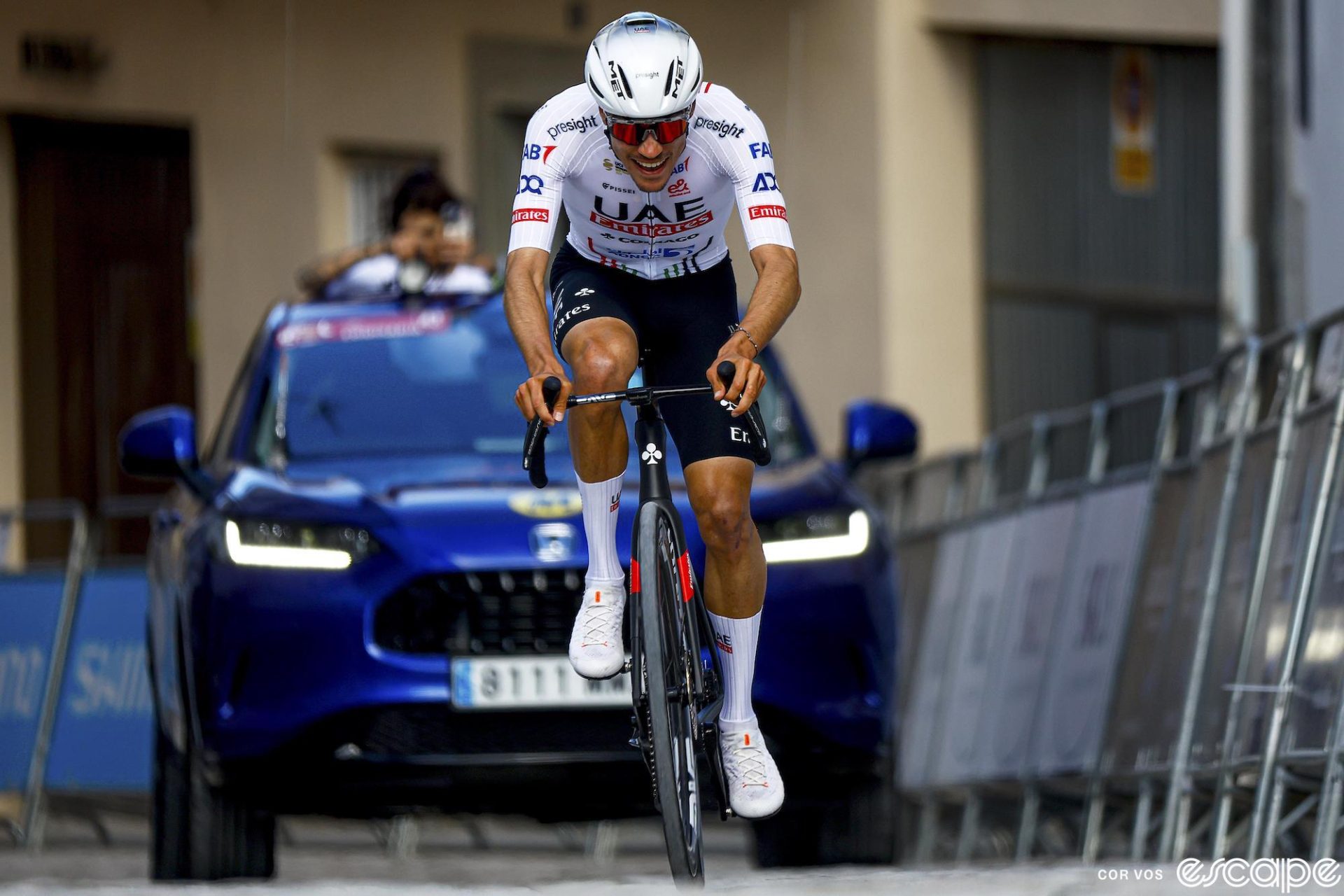
The result: instead of 800 hilly kilometers of racing across five days, riders got less than 10 minutes of race action. Most big-name stage racers were in Portugal for the Volta ao Algarve, but seven WorldTour teams were in attendance in Andalucia, and the stage race specialists who missed out on a key five-day racing block included Juan Ayuso, Santiago Buitrago, and Jack Haig.
In addition to those key race miles, riders also sacrificed the chance for a result. Surprise winner Van Gils got just 20 UCI points for his trouble, not the 220 originally on offer – points that may become dramatically important at the end of next year when the relegation cycle comes to a close again as his Lotto Dstny team fights for ranking.
Protests aren’t the only thing that shortens or cancels races, of course – witness last week’s climate-fueled chaos in Oman. But for racers and teams who’ve carefully constructed competition calendars, the last-minute changes are far from ideal as they start their spring campaigns.
No one has any idea whether bike races will continue to be affected, much less which one might be next. It may be a major event; as the blog INRNG noted in a post about the Étoile des Bessèges stage cancellation, the Tour de France has enough political capital to overcome protests, but smaller races (which is almost everything else) don’t have the same juice.
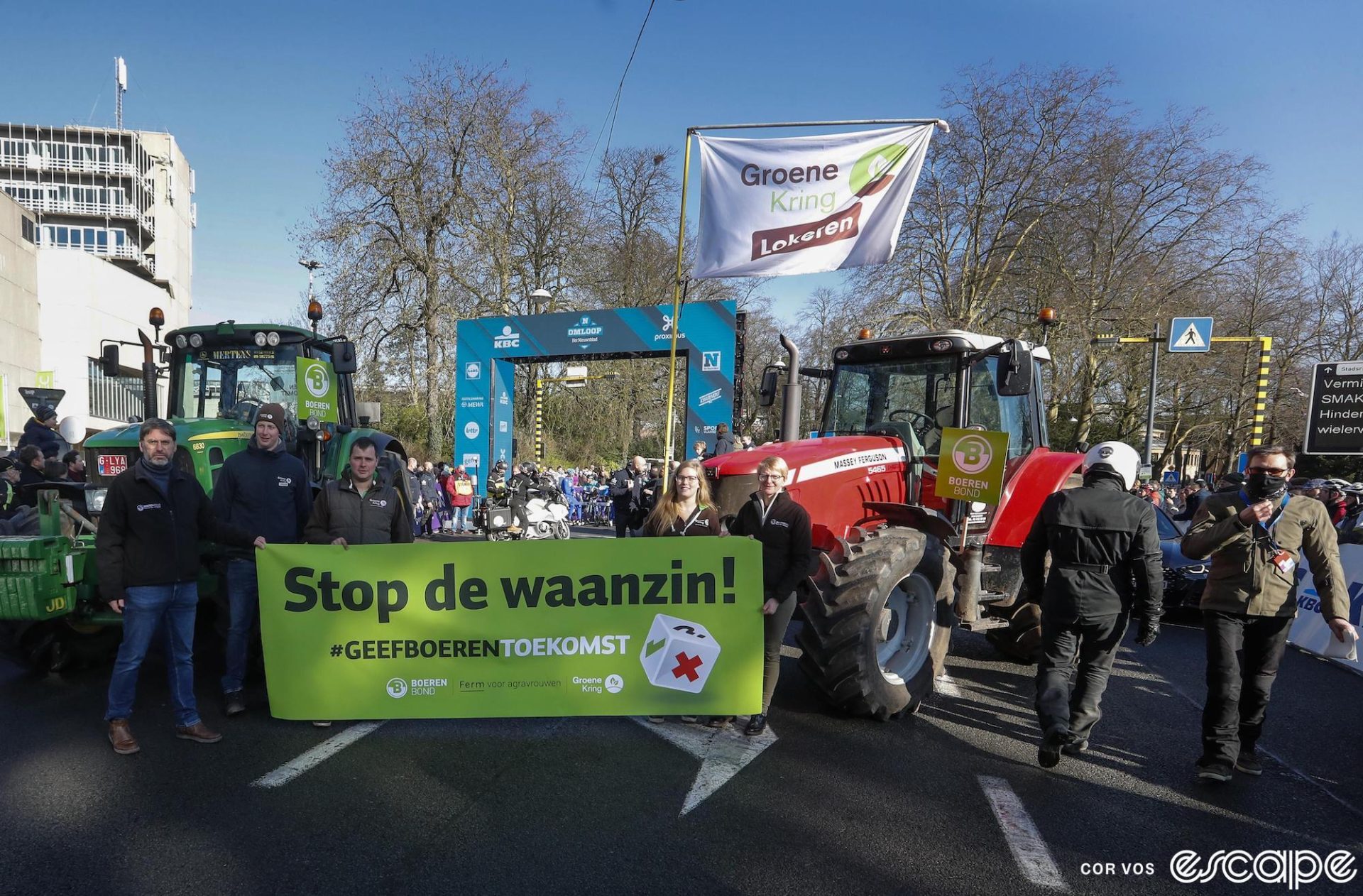
And protest upheaval may continue: countries that have seen sustained protests include France, Belgium, the Netherlands, Italy, and Spain. With racing winding down in the southern hemisphere and Middle East, the sport returns to its traditional hot spots, and all five countries host significant amounts of the men’s and women’s WorldTour calendars the next few months.
European lawmakers are responding to the farmers’ demands. EU officials delayed some new rules on biodiversity, for instance, and national lawmakers have softened some of the diesel tax plans, while France offered €150 million in tax and social support funding, leading two major farmers unions to call for an end to the roadblocks. But one of the unions warned they could resume if the government doesn’t do more. Meanwhile, protests continue elsewhere and may become a factor in EU Parliament elections in June; far-right parties, keen to seize a chance to increase their power, have allied themselves with the farmers’ cause.
Finally, farmers themselves are starting to target specific events rather than just blocking roads. Last week in San Remo, Italy, farmers focused on disrupting a music festival. Bike racing – popular enough to provide a protest platform but not provoke a backlash, and specifically vulnerable to farmers’ methods – might see its podiums unwittingly coopted for something else entirely.
What did you think of this story?
